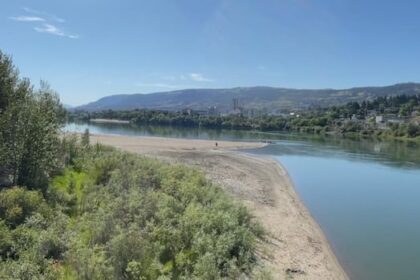PEIResearchers are studying a great white shark found along Prince Edward Island’s North Shore to try and figure out how the large marine animal died. 4-metre-long marine animal was hauled to Atlantic Vet College for necropsyStephen Brun · CBC News · Posted: Nov 12, 2025 5:00 PM EST | Last Updated: 1 hour agoListen to this articleEstimated 4 minutesThe audio version of this article is generated by text-to-speech, a technology based on artificial intelligence.The adult male shark was first discovered alive by passers-by on Oct. 30, stranded in shallow waters on a beach near Stanhope in P.E.I. National Park. (Dave McRuer)Researchers are studying a great white shark found along Prince Edward Island’s North Shore to try and figure out how the large marine animal died. The four-metre-long, adult male shark was first discovered Oct. 30 by passers-by, stranded in shallow waters on a beach near Stanhope in P.E.I. National Park. By the time Parks Canada ecologists found it again the next morning, the 2,000-pound creature was dead on a sandbar near Tracadie. A team managed to tow the great white to a nearby wharf, then hoisted it onto a trailer to haul it to the Atlantic Veterinary College in Charlottetown. ‘I think a lot of people assumed it was some kind of decoration,’ says Dave McRuer, a wildlife veterinarian for Parks Canada, about other drivers seeing the great white being hauled in an open trailer from the North Shore into Charlottetown. (Dave McRuer)“It took us at least a half an hour, 40 minutes to get it to shore, probably just as long to get it up on the trailer,” Dr. Dave McRuer, a wildlife veterinarian for Parks Canada, said of the process.“Because it was pretty much on Halloween, I think a lot of people assumed it was some kind of decoration…. You don’t see that every day.”Great white sharks are common in Atlantic waters, but strandings and deaths around P.E.I. are not. Laura Bourque, a wildlife pathologist with the Canadian Wildlife Health Cooperative at the vet college, said the last time a great white washed up on Island shores was two years ago. Bourque performed a necropsy on the shark once it arrived at the AVC. Great white sharks are considered to be an endangered species in Canada, so trying to determine the cause of death through the AVC’s necropsy will be important. (Laura Bourque)“He had just had a very large meal of grey seal and harbour porpoise, so he was eating and doing quite well right up until he died,” she said. “We didn’t see any indication that there might have been trauma or some other potential human-caused issue in his death.” Seeing sharks, even though it might scare some people, it’s a sign of a healthy ecosystem- Neil Hammerschlag, Shark Research FoundationGreat white sharks are considered to be an endangered species in Canada, so trying to determine the cause of death will be important. Bourque said not much is known about many white shark diseases and infections — and thus, tests for some conditions don’t even exist yet. “It’s always possible that we might not find anything, and that’s always very frustrating,” she said. “But if we do find something interesting, inflammatory or infectious, that could take quite a few months before we can get that sorted out.” Great white populations reboundingWhile an as-yet unexplained death of a great white is disappointing for researchers, it could also mean a sign of hope for their Atlantic population. Neil Hammerschlag, executive director of the Shark Research Foundation, said great white sharks are visiting these waters more frequently — most likely a result of rebounding numbers and warming Atlantic waters. Neil Hammerschlag, executive director of the Shark Research Foundation, says the shark found on P.E.I. was first spotted and tagged off of Cape Cod around 10 years ago. (Dave McRuer)“Seeing sharks, even though it might scare some people, it’s a sign of a healthy ecosystem,” he said. “To know these animals are in the waters of Atlantic Canada is kind of special. Not many places in the world can say they have great whites swimming around.” Hammerschlag said the shark found on P.E.I. was first spotted and tagged off of Cape Cod around 10 years ago. While the animal’s death is concerning, he said Islanders shouldn’t be worried about great whites venturing closer to the province’s beaches. “People actually have more to fear for sharks than of sharks because shark populations globally are declining and many of them are threatened with extinction,” Hammerschlag said. “We have a lot of sharks in our waters, and I feel like we should kind of embrace that.”ABOUT THE AUTHORStephen Brun is the copy editor for digital news at CBC Prince Edward Island. A graduate of UPEI and Holland College, he has been a writer and editor for a number of newspapers and websites across Canada for nearly two decades. You can reach him at stephen.brun@cbc.ca.With files from Laura Meader
‘You don’t see that every day’: Great white shark found dead on P.E.I. beach











